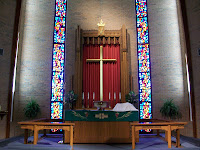We
started our study this week of “Making
Sense of the Cross.” In a lot of
ways that’s what we do in Lent – we think a lot about the cross, pondering
Jesus’ death, trying to make sense of it, to understand what it means for us.
One
of the big discussion points in the first chapter is that what you see in Jesus
is what you see in God. Or another way to put it, Jesus in his life, his
ministry here on earth, his death and resurrection reveal who God is.
So
what does today’s reading reveal about God and what is God doing?
The
Pharisees show up and warn Jesus that Herod is out to kill him. They urge him to
leave, to go away from this place to somewhere safe.
Did
the Pharisees care that Jesus was in danger?
Maybe. It’s entirely possible
that these particular Pharisees were sympathetic to Jesus.
Maybe
it was one of those “the enemy of my enemy is my friend” things- the Pharisees
didn’t like Herod, and Herod was threatening another Jewish teacher.
Or
maybe this was a way to get Jesus out of their hair – Herod is going to kill
you, so you better leave, better quit all this healing and casting out demons
and teaching your radical ideas, and challenging the way things are. Stop your ministry – or at least go somewhere
else.
Whether
it was genuine concern or an attempt to divert Jesus from his ministry – the
Pharisees warning was a temptation to for Jesus to abandon God’s call on his
life.
Jesus
doesn’t take the bait.
Jesus’
response – “Go tell that old fox Herod exactly where I am and what I’m
doing. It won’t matter. I have a mission and nothing is going to get
in the way of that mission. I’m heading
to Jerusalem, and until I get there, Herod can’t touch me.”
This
is a picture of complete and total trust in God.
This is a picture of a God who will stop at nothing to bring humanity back into relationship.
A God who will fiercely protect God's children.
Just like a mother hen.
Jesus
turns to face Jerusalem and laments what will happen once he gets there: How often have I desired to gather
your children together as a hen gathers her brood under her wings.
This is a clear reference to biblical images of God sheltering people under
God’s wings. Usually the bird is an
eagle. But here Jesus chooses a chicken
– a mother hen.
It’s an unusual image for God. Eagles,
the lion of Judah, - usually when God is likened to an animal, it’s a strong
animal, a powerful animal, an animal of fierce protection. A lowly chicken would appear to be rather the
opposite of that.
But if you know anything about chickens, you know that a mother hen is
fiercely protective of her chicks. A rooster will fight, and fight viciously at
that. Or if he senses that the danger’s too great he’ll fly away.
Not a mother hen. She clucks over her chicks from the moment the eggs are
laid. If she finds a good place for food
she’ll call to them, encouraging them to eat. She spreads her wings, covering
her chicks at night, keeping them close to her for warmth and protected from
danger around them. She will put herself between her chicks and any threat –
standing up to snakes and coyotes, outsmarting foxes and raccoons, vigilantly
on the lookout for hawks and skunks and the occasionally stray dog. She stands her
ground – any fox that wants her chicks will have to go through her first!
Any fox will have to deal with her first.
So we have Jesus, the mother hen, pitted against Herod the fox.
Apparently the baby chicks of Jerusalem would much rather play with the fox
then take shelter under their mother’s wings.
Sometimes we flock to the danger of playing with the fox. We turn a deaf ear to our Mother Hen calling
us to run to the protection under her wings.
Jesus
longs to gather Jerusalem – longs to gather all his baby chicks who wander this
way and that way, unaware of the danger that surrounds them, enticed by the fox:
“Jesus won’t be king
of the jungle in this or any other story. What he will be is a mother hen, who
stands between the chicks and those who mean to do them harm. She has no fangs,
no claws, no rippling muscles. All she has is her willingness to shield her babies
with her own body. If the fox wants them, he will have to kill her first.
Which
he does, as it turns out. He slides up on her one night in the yard while all
the babies are asleep. When her cry wakens them, they scatter. She dies the
next day where both foxes and chickens can see her -- wings spread, breast
exposed -- without a single chick beneath her feathers. It breaks her heart,
but it does not change a thing. If you mean what you say, then this is how you
stand.”[i]
Fiercely
protective, sheltering, nurturing, giving everything for us - God’s mighty hand
and outstretched arms are most powerfully revealed on the cross.
There’s
an old saying – I asked Jesus how much he loved me. Jesus said, “This much” – then he stretched
out his arms and died.[ii]



